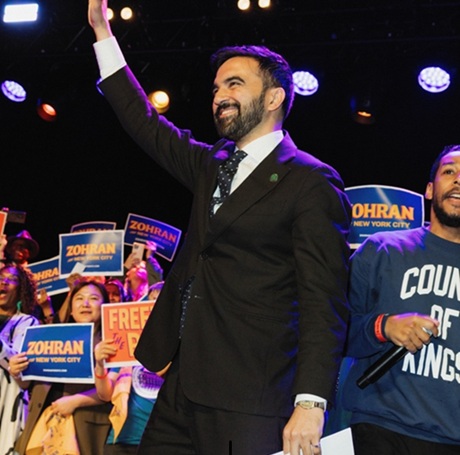
Photo Credit: Zohan Kwame Mamdani FB
By Dr Rahim Said
Zohran Mamdani’s victory speech as New York’s newly-elected mayor was not just an address to jubilant supporters — it was a manifesto of moral courage and a reminder that politics, at its best, is still capable of poetry.
From the very first line, invoking Eugene Debs and “the dawn of a better day for humanity,” Mamdani reclaimed politics from the cynical and the self-serving.
But why should Malaysians — half a world away — pay attention to a socialist Muslim mayor in America’s largest city?
Because his win and his words resonate with the very crisis of leadership and moral fatigue that Malaysia is facing today.
Mamdani’s speech pulsed with empathy, conviction, and unflinching clarity: that politics belongs not to the wealthy or well-connected, but to the working people whose hands, “bruised from lifting boxes,” have too long been denied power.
That sentiment should strike home in Malaysia, where we too often hear that power is something to be inherited, not earned; that the rakyat’s duty is to applaud, not to question; and that hope must always yield to pragmatism.
In New York, Mamdani spoke of “toppling a political dynasty.”
In Malaysia, our dynasties remain very much intact —cloaked in different party colours but united in one thing: survival.
His promise of a “government that delivers” contrasts sharply with our culture of committees and commissions, where delivery is postponed, and responsibility is diffused.
He dared to declare, “We have stepped out from the old into the new,” while Malaysians are still trapped in the old — recycling leaders and their tired excuses, debating the same old scandals while the cost of rice, education, and dignity climbs relentlessly higher.
There was another reason Mamdani’s speech resonated: he stood proudly as a Muslim, an immigrant, and a democratic socialist, refusing to apologise for any of it.
That confidence — faith without fear, conviction without arrogance — is precisely what Malaysia’s multireligious society needs.
We live in a nation where religion is too often weaponised for political gain, where being Muslim is treated as a badge of purity rather than a call to justice.
Mamdani’s assertion that “the more than one million Muslims know that they belong — not just in the five boroughs of this city, but in the halls of power” is a quiet but profound rebuke to the exclusionary politics practised even in some Muslim-majority countries.
Imagine, for a moment, a Malaysian leader speaking in the same moral cadence.
Imagine someone saying: “This nation belongs to all who build it — the paddy farmers of Kedah, the nurses of Penang, the shopkeepers of Klang, the migrant workers who built our skyscrapers.”
Imagine someone bold enough to promise not handouts, but fairness; not slogans, but a system that “makes the city love its people back.”
Mamdani also reminded his listeners that “hope is a decision.” That, too, is a message Malaysia desperately needs.
We have grown weary of corruption trials that lead nowhere, of grand announcements that dissolve into silence, of a political culture that has mistaken caution for competence.
Hope has become a luxury here, rationed carefully, lest we be disappointed again. Yet Mamdani’s victory shows that hope, when organised, becomes a movement.
He closed his speech with a promise that his city would be defined not by division, but by compassion and competence — “no longer at odds with one another.”
In Malaysia, that sounds almost utopian. We have grown used to thinking that caring for the people must come at the expense of managing the books, or that moral integrity is incompatible with political survival. Mamdani refuses that false choice, and perhaps that’s the true lesson for us: governance can be decent and effective.
So yes, Mamdani’s victory speech matters. It matters because it restores faith that politics can still speak with humanity.
It matters because it shows that a young, unapologetically Muslim leader can win by appealing to shared values, not sectarian divides. And it matters because it challenges Malaysians to demand the same — from those who claim to lead us, and from ourselves.
When Mamdani said, “This power, it’s yours. This city belongs to you,” he was speaking to New Yorkers.
But somewhere between the Bronx and Bukit Bintang, between Harlem and Hulu Langat, those words should echo too.
Because Malaysia will only find its dawn when its people, like those in New York, finally decide to take back the night.
The views expressed here are entirely those of Dr Rahim Said.
WE